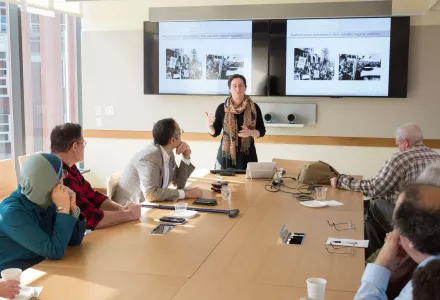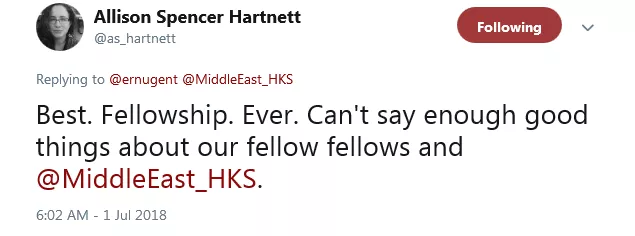

Allison Spencer Hartnett
During the 2017-2018 academic year, MEI hosted six research fellows supported by the Emirates Leadership Initiative. The fellows – including two doctoral candidates and four postdoctoral researchers – conducted independent research projects, presented their ongoing work to the public, participated in several MENA-focused seminars and workshops, and contributed to the broader Harvard community through other events, activities and collaborations. We sat down with pre-doctoral research fellow Allison Spencer Hartnett to discuss her research on autocracy, colonialism, and land reform in the Middle East, her time at MEI, and her research agenda moving forward. Follow her on Twitter @as_hartnett.
This interview has been edited for length and clarity.
What are the central questions your research tries to address?
ASH: My research aims to understand authoritarianism in the Middle East by examining the history of state building across the region, through the o en overlooked lenses of agrarian relations and colonial legacies. Specifically, I trace land policies under colonialism and post-in- dependence as a window into political continuity and change as new states emerged. In many cases, land reform in the Middle East de ed conventional wisdom – redistribution o en destabilized the elite coalitions in new regimes, the effects of which are still being felt in many MENA states.
What methods do you use for your research? Why?
ASH: I began with a regional quantitative model testing land redistribution against regime failure over time in 18 countries. Remarkably, most redistribution correlated to regime failure, leading me to delve into the mechanisms of my model with historical sources. I categorized landed elites and reforms in each country and coded winners and losers. at data showed that regimes collapsed only when reforms directly targeted landed elites. In contrast, reforms that allowed landed elites or regime cronies to gain land yielded stable regimes. Curious why these more radical reforms happen, I looked deeper into two cases: Iraq and Jordan, using Ottoman, British, Jordanian and Iraqi archives in Jordan, the U.K., and the U.S.; subnational data on land tenure, laws, and state institutions over time; and interviews with Iraqis and Jordanians, from officials down to migrant (often Egyptian) laborers in farm fields.
Iraq and Jordan had similar initial conditions and were both colonized by Britain, but Iraq’s regime fell a er enacting radical land reform, while Jordan’s more measured reforms preserved the regime’s elite coalition. Ottoman records in Jordan were settled and detailed down to individual plots – giving everyone a clear stake in the property system. In Iraq huge swaths of rural land were registered to tribal sheikhs who served as proxy governors and tax collectors. When the British privatized property using Ottoman records, Jordanian elites were subject to rule of law, while Iraq’s feudalist landlords held almost all rural land and thus veto power over the Hashemite government.
What has been the most unexpected/surprising discovery in your research?
ASH: During the Arab Spring, the English press missed protests in Jordan claiming pre-colonial land rights, contesting laws that have been on the books since the 1930s. Their claims stemmed from Ottoman-era land rights. Honestly, had I not been studying Jordanian land policy, I would not have caught it. e protests triggered a Parliamentary inquiry, even though agriculture has declined to only 3% of Jordan’s GDP and rural population has fallen from 50% to below 15%, land’s continued political salience was remarkable, as was the durability of the property system.
What are the main academic and policy takeaways from your research?
ASH: To understand how modern state institutions function and why they tend to be so weak and/ or repressive, academics and policymakers need to study agrarian relations and historical legacies. Analysts o en focus on oil and aid rents and authoritarianism, but forget that state institutions, shaped by agrarian relations over time, mediate these forces. Of course, states and leaders have agency, but historical legacies confine their choices. In fragile states like Iraq, lack of clear land ownership settlements or norms made essential state functions – taking a census, taxing citizens, planning land use and economic development – near impossible. Iraq remains a weak state lacking legitimacy and cohesion. As for more tangible policies, I am encouraged to see the development sector begin to inform policy implementation by engaging local interests and institutions, with tools like stakeholder mapping. Often donors have failed when trying to enact policy prescriptions without grappling with local politics.
Right near the end of your fellowship year, Jordan erupted in massive protests against proposed tax reforms, including income tax rates, leading to a change in government. Did your research give you any insight into the protests?
ASH: My research gives me a front seat to Jordan’s social contract, so I really saw these tax reforms’ political significance. During and a er colonial rule, taxes were primarily on land until those were repealed in the 1950s to appease landed elites. Taxes were essentially not collected until structural reforms in 1989 levied income taxes primarily on the urban professional middle class. e latest proposed tax hikes again targeted the middle class, recently squeezed by other macroeconomic pressures, and they reacted.
Professional associations were in the streets leading protests, which was unprecedented. Their newfound political voice could eventually lead to more structural change, but for now the same elite from colonial times continue to dominate, driving perilous middle and lower class dissatisfaction with the political status quo.

What was the most valuable aspect of your time at MEI, the Kennedy School, and Harvard?
ASH: My fellow fellows! We had this amazing brain trust of people with similar passions and expertise, all interested in each other’s work and success. They read and reread drafts of my papers and dissertation and held whiteboard sessions to help translate my empirical research into theory. And we built so many collaborations just being in the same space. Hilary Rantisi, Tarek Masoud, Melani Cammett, and Kristin Fabbe were incredibly supportive of my work as well as helping establish new collaborative projects. And of course, thanks to the MEI team for making everything happen behind the scenes. It was a wonderful year and I will miss it tremendously!
What is next for you and your research?
ASH: Next year, I join Yale as a postdoctoral fellow at the Leitner Program on Political Economy and as a lecturer of political science. I’ll be turning my dissertation into a book manuscript and teaching a course on the political economy of authoritarianism in the spring. I will continue collaborations started at MEI with Kristin Fabbe, Liz Nugent, Melani Cammett and Gabriel Koehler-Derrick. I will also work on setting my future research agenda, mainly bringing my historical work up to the present day and exploring the link between colonial institutions and state building in the Middle East.
Read the full 2017-2018 Mosaic
<p>This article appeared in MEI's 2017-2018 Mosaic. The full issue of Mosaic can be found here!</p>
“A Front Seat to the Social Contract.” Mawhorter, Christopher, ed. December 20, 2018


